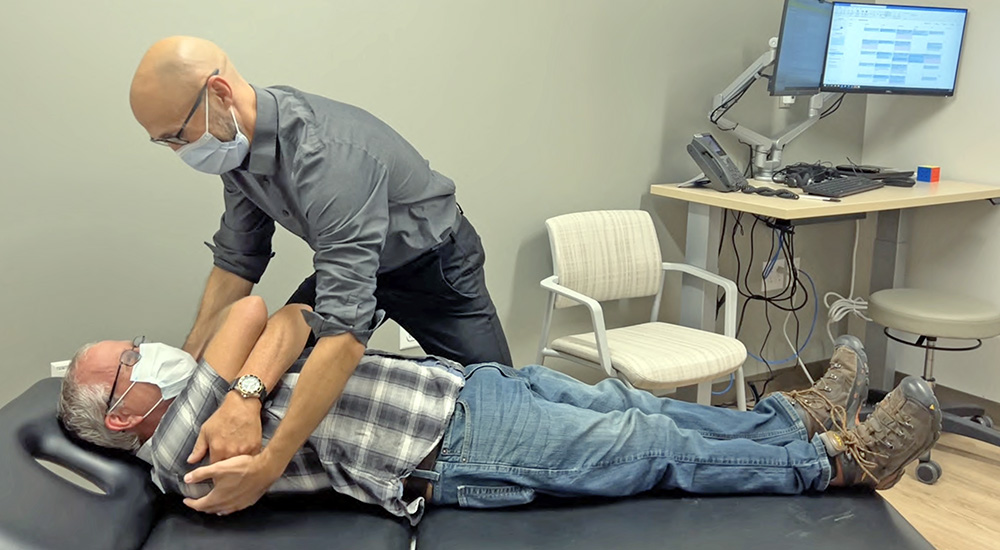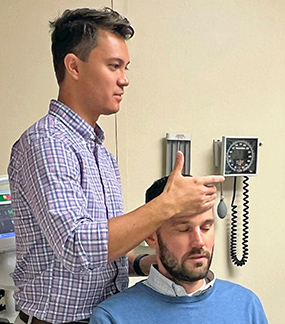Chiropractors and chiropractic residents at the Fort Dodge Community Based Outpatient Clinic (CBOC) in Iowa are making a big difference in Veteran care.
When Air Force Veteran Marty Alne experienced severe back pain a few years ago, his treatment option was like many Veterans who live in rural locations. He had to travel more than two hours to the Des Moines VA or see the only community chiropractor near him.
Today, that has all changed thanks to chiropractors and chiropractic residents who are working, teaching and training at the Fort Dodge CBOC.
VA’s health professions education programs now include 10 integrated clinical practice chiropractic residencies across the U.S. The programs are providing access to more interprofessional care for rural Veterans while training future health professionals.
Nathan Hinkeldey, Des Moines VA Chiropractic Residency Program director and Palmer College of Chiropractic faculty, believes placing residents at rural CBOCs is extremely important because musculoskeletal pain is one of the most common issues for Veterans.
Direct access makes care more efficient
“Access to care in rural areas is low. This type of direct access to providers who are chiropractors and physical therapists makes care more efficient,” Hinkeldey said. Des Moines VA has both chiropractors and physical therapists who work collaboratively at its Fort Dodge CBOC.
The value of accredited VA chiropractic residencies goes beyond access to care. The integrated clinical practice chiropractic residency programs provide advanced clinical training with a primary focus on treating complex patients in an interprofessional team.
Serving Veterans in rural communities was one of the main reasons chiropractic resident Ian Le, who completed training at Bay Pines VA in Florida, chose to complete his residency at the Des Moines VA.
“Having a chiropractor in a CBOC is extremely valuable,” he said. “We work hand in hand with the primary care doctors, the physical therapist, the occupational therapist, and neurology. I think one of the valuable things about VA residency is that we’ve demonstrated the value of chiropractors in a multidisciplinary health care system.”
Also work with the neuromusculoskeletal system
While many think of chiropractic care as a way to alleviate neck and back pain, Le says they also work more globally with the musculoskeletal system and the neuromusculoskeletal system.
“We have a lot of patients who have peripheral neuropathies, conditions that might also be co-managed with a neurologist.” Hinkeldey credits his training at Bay Pines VA with preparing him to see more complex patients than he would normally see in private practice during his residency.
“It means a lot to us that they give us that care.”
Hinkeldey says VA is setting the standard for chiropractic training and care, adding that he expects more private hospital chiropractic residency programs will be established based on VA’s interprofessional training programs.
Veteran Marty Alne is just grateful to have quality chiropractors close to home. “It’s a special kind of person that works at VA. It means a lot to us that they give us that care.”
VA recognizes the more than 1,400 educational institutions that partner with VA to train future health professionals. These academic affiliations, some of which began more than 75 years ago, are coordinated by VA’s Office of Academic Affiliations.
Find out more about VA’s academic mission by watching this video and visiting the Office of Academic Affiliations website.
Topics in this story
More Stories
Bob Jesse Award celebrates the achievements of a VA employee and a team or department that exemplifies innovative practices within VA.
The Medical Foster Home program offers Veterans an alternative to nursing homes.
Watch the Under Secretary for Health and a panel of experts discuss VA Health Connect tele-emergency care.








It would be great if the VA covered Chiropractic care for veterans. But not in my area.